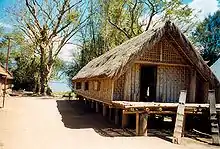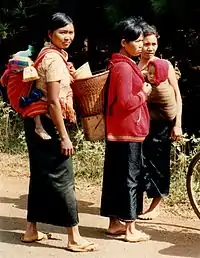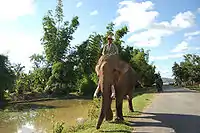Mnong people
The Mnong or Munong (Vietnamese: người Mơ-nông) are an ethnic group from Vietnam (127,334 in 2019) and Cambodia.
| Total population | |
|---|---|
| Regions with significant populations | |
| Đắk Lắk, Đắk Nông, Lâm Đồng, Bình Phước - Mondulkiri - | |
| Languages | |
| Mnong, others | |
| Religion | |
| Christian, Theravada Buddhism, Animist |



History
Mnong can be subdivided into three groups :
- Central Mnong: around 88,000 people in the Đắk Lắk and Lâm Đồng provinces of the Central Highlands, mostly of the Christian religion
- Eastern Mnong: around 76,000 people in the Đắk Lắk and Lâm Đồng provinces of the Central Highlands
- Southern Mnong: around 55,000 people in the Bình Phước province of southeastern Vietnam
A number of Mnong live in the eastern Cambodian province of Mondulkiri where they are known as Bunong (alternatively spelled Phnong, Punong, or Pnong). The Mnong people have been widely persecuted and discriminated against because they were thought to have aided North Vietnam in its civil war against South Vietnam and the United States of America during the Vietnam War. They were brutally massacred and have been neglected for decades for their unproven "Engagement" with the Viet Cong.
Culture
Every group speaks a variant of the Mnong language, which along with Koho language, is in the South Bhanaric group of the Mon–Khmer family.
Epics (Mnong language: Ot N'rong- Ot: telling by singing the poem, N'rong: old story) take an important part in Mnong people's life. Many of these epics, such as Ghu sok bon Tiăng, are quite long.
Notable people
- N'Thu K'Nul, a Lao-Mnong person, a chieftain who established Buôn Đôn, a famous elephant hunting and taming village, in Đắk Lắk Province. He caught a white elephant and gave it as a present to the Thai royal family in 1861, leading the king of Thailand to bestow upon him the name "Khunjanob" (literally "Elephant Hunting King")
- N'Trang Lơng, communist hero who led villagers against French colonizers
- Điểu Klung, epic teller
- Điểu Kâu, ethnologist
See also
References
- "Report on Results of the 2019 Census". General Statistics Office of Vietnam. Retrieved 1 May 2020.